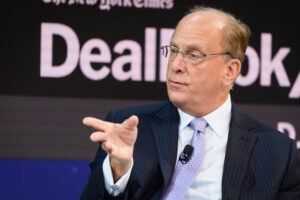Last month BlackRock announced plans to lay off 500 workers as the asset management giant and environmental, social and governance (ESG) acolyte contends with unprecedented 2022 losses. The losses are the worst in nominal terms for a 60/40 portfolio since the financial crisis of 2008-9 and the worst in real terms in a calendar year since the Great Depression in late 1929. According to the firm’s most recent earnings report, the company’s assets under management declined from $9.5 trillion in the third quarter of 2021 to $8.0 trillion in the third quarter of 2022 and delivered more than a twelve percent drop in net income.
But what precipitated such losses? Could it be old fashioned market volatility? Or was it the result of flawed strategic analysis, poor policy, or as BlackRock asserts, a problem intrinsic to its portfolio structure (60/40) that they now insist is outdated? Many in the industry, including icons like Goldman Sachs reject the assertion and acknowledge that at some point, every strategy bumps up against non-ideal market conditions through which firms must necessarily navigate.
Industry experts are breaking on both sides of the portfolio-structure argument, teeing up great debates in the months ahead. In the meantime, however, there is a compelling bit of information already known about what underpinned at least some of BlackRock’s historic losses. Rather than an outdated portfolio structure, perhaps a simple rejection of BlackRock’s evangelical approach to ESG contributed to the abysmal outcome in 2022.

Would you trust this man with your money?
BlackRock has regularly out-performed the broader market. Their moves are famously, or perhaps infamously, aped by others on Wall Street. As such BlackRock, for good or bad, influences the market in both tangible and intangible ways. Beginning in 2017, CEO Larry Fink began to increasingly focus on stakeholder capitalism and ESG. He famously said at the time that he intended to change the direction of corporate America. “At Blackrock we are forcing behaviors,” he said of the company’s ESG-scoring approach. He ordained himself the brand ambassador for both stakeholder capitalism and ESG, using BlackRock, a publicly traded company, as the podium from which to proselytize.
A creation of World Economic Forum (WEF) Founder, Klaus Schwab, "stakeholder capitalism" and the ESG construct were introduced through the WEF eco-system of non-profits, NGOs, financial partners and governments beginning in the early 1970’s (stakeholder capitalism) and in 2000, (ESG). Both have become central elements in the effort of asset management firms to re-orient capital flows. Controlling the capital markets gives the WEF-trained ideologues the ability to re-direct capital toward the social and political objectives important to them, even in defiance of the economic interest of their clients, many of which are the pensions funds of average American workers. "Climate change" is the pretense, "stakeholder capitalism" the philosophy, and ESG the unholy mechanism.
Because ESG has become a central focus of Fink in his role as an asset manager, many have pondered the degree to which his WEF board position may be affecting his objectivity. According to the WEF’s own description, the board “…serves as the guardian of the World Economic Forum’s mission and values.”
So what are the values Mr. Fink has agreed to uphold? The Forum's mission includes engaging leaders of society to shape global, regional and industry agendas. Since part of the agenda of the WEF includes divesting of fossil fuel, for example, the concern of BlackRock clients becomes clear and quite legitimate. The overt capital market manipulation that he has championed as asset manager is seemingly based on objectives defined by the WEF rather than by the sole interest rule and fiduciary obligations codified in U.S. law..
Has asset manager Fink influenced the WEF through his leadership at BlackRock? Or, has his position as a WEF board member and guardian of WEF’s mission and values been used to influence the investment priorities and focus of BlackRock and the larger financial sector? It is a question for BlackRock clients, litigators, and regulators.
Regardless, it is clear that BlackRock has embraced the key tenets of stakeholder capitalism and ESG as a mechanism to re-direct capital away from industries with which Mr. Fink and WEF member-companies disagree, and toward the companies and industries they believe will drive some of the most significant political and societal change ever imagined:
https://twitter.com/backtolife_2023/status/1625906098933837845?s=20
None of this is news to BlackRock of course. They were alerted to client discontent in early 2022 when Arizona’s treasurer quietly pulled $543 million from the firm. Then in early August last year, the exodus began after 19 state attorneys general sent a joint letter to the company expressing concerns that its ESG agenda was impeding its ability to deliver a maximum return on investment for its shareholders—a legal obligation. They wrote: “Rather than being a spectator betting on the game, BlackRock appears to have put on a quarterback jersey and actively taken the field.”
So as BlackRock and industry experts ponder how recent historic losses can be avoided in the future, perhaps they should start by being schooled about the difference between an asset manager and a political operative.
Article tags: BlackRock, ESG, Klaus Schwab, Larry Fink
Black goes Green